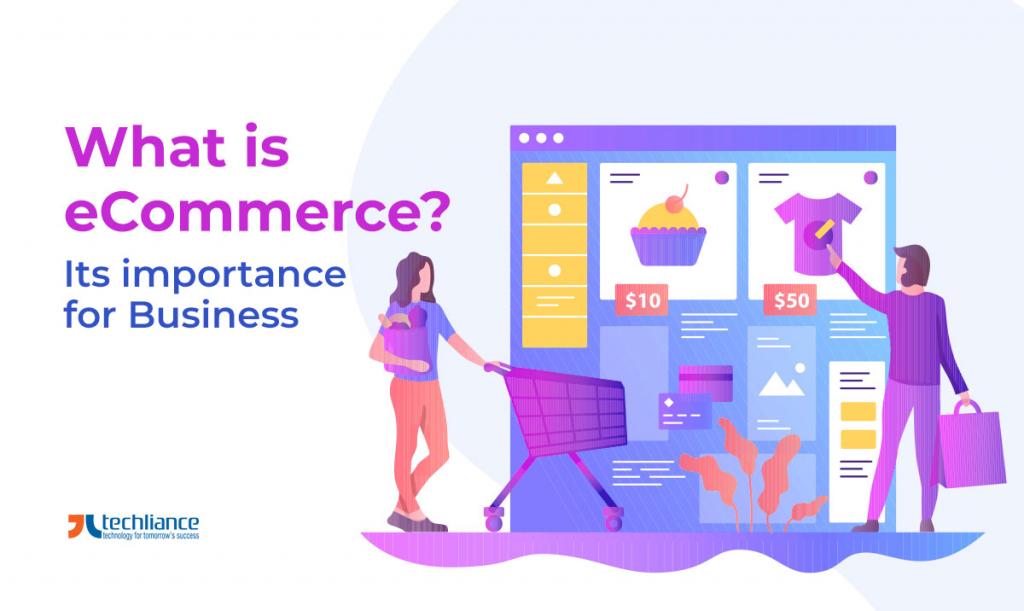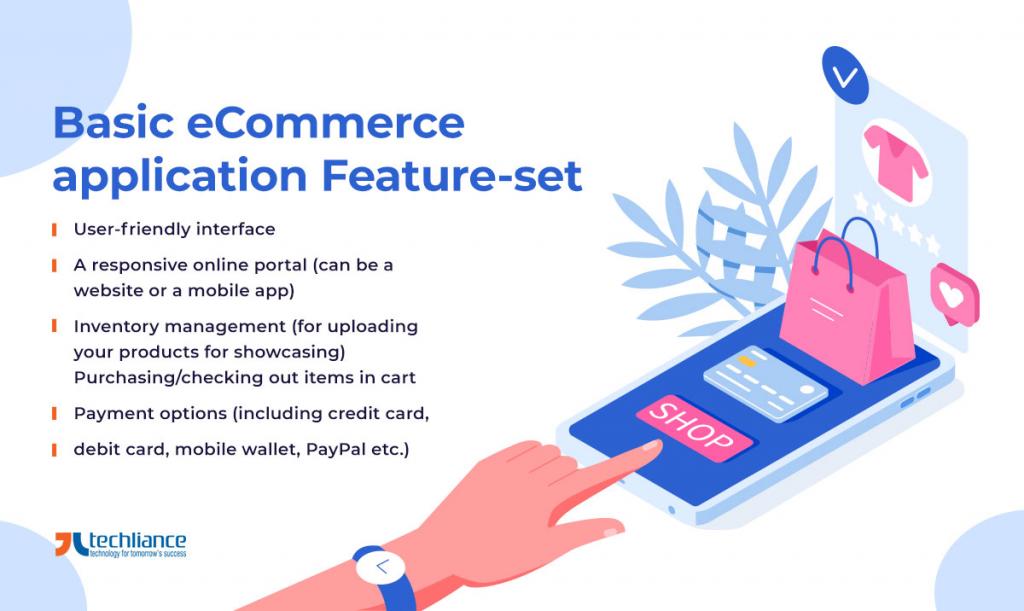In today’s rapid complex world, it is all about consumers and their preferences. eCommerce has always been a way for a higher reach to users worldwide. It makes easy to purchase products and services online.
Previously, a lot of companies thought of electronic commerce as an option.
But it has become an absolute essential aspect for survival of your business, in fierce competition of these days.
Thanks to COVID-19, our lives will never be the same and the new normal is all about social distancing.
This makes companies think of ways to reach to their consumers and still stay safe from the ongoing pandemic.
Economic slowdown has affected many industries around the globe.
While the business sectors which have potential to serve customers at their doorsteps are thriving.
In the same way, e-commerce will keep progressing in the decade of 2020.
Therefore, take benefit of eCommerce Development solutions to set up online store, and keep serving consumers irrespective of lock-downs.

What do you mean by eCommerce basically?
eCommerce, an acronym for electronic commerce, is the action of buying and selling of products or services, using electronic networks like internet.
It involves the online payment of money, and transmission of data to perform the transactions.
This is also known as internet commerce, and online commerce.
It can include purchasing and sales over several online mediums.
Electronic payment systems involve credit cards, debit cards, PayPal, mobile money wallets etc.
In recent years, cash on delivery (COD) has increasingly become a choice for payment.
Some eCommerce businesses are also supporting cryptocurrencies like Bitcoin as online payment method.
eCommerce Stats
Given below are some interesting statistics about eCommerce, especially customer spending, that indicate its growth potential.
- Till 2023, eCommerce sales will have a share of 22% of worldwide retail expenditure.
- U.S. e-commerce & retail revenue will increase to $740 billion by 2023.
- Big brands rule the eCommerce and omni-channel retail vertical. Amazon, Google, and Facebook continue leading online (due to revolution in technology and commerce).
- More than 75% of people are shopping online once as a minimum per month because of convenience.
- Consumers purchase entertainment online more than everything else. This is why brands like Netflix, Spotify and Disney+ are gaining more popularity among users.
- While 94% of Chinese customers do mobile transactions, whereas only 45% of Americans make use of mobile payments.
Why you need to be an eCommerce business?
Currently, a lot of businesses are feeling the heat, because of lesser demand for their products.
Physical retail outlets are facing a crisis with lesser number of visitors daily.
The best way to re-establish yourself is to be the one who makes the journey to the users’ homes.
How can you achieve this?
Simply, have an eCommerce website, or a mobile app developed, that helps you be accessible 24/7 to the users.
Showcase your product range online.
So that your users have the facility of buying online whatever they need.
It will save them from having to take the risk of going out of their homes.
Electronic Commerce is your Savior
This starts off with the simple idea of accommodating your user.
Likewise, it also helps you in keeping your business afloat.
You need to identify the type of eCommerce product or solution that you want to develop.
A simple eCommerce application consists of the following.
- User-friendly interface
- A responsive online portal (can be a website or a mobile app)
- Inventory management (for uploading your products for showcasing)
- Purchasing/checking out items in cart
- Payment options (including credit card, debit card, mobile wallet, PayPal etc.)

These are some of the important aspects to consider for e-commerce application development.
Some businesses have lesser budget and are just starting out on the online shopping venture.
So, they prefer to go for a website that will allow them to be explored by their users.
While some want a mobile app, because they already have a strong customer-base and their brand is well known.
They also have a proper budget for getting a mobile app developed either in Android and iOS platforms (native app in this case).
Companies with budget constraints can go the route of near native app (developed in Flutter or React Native) or cross platform app.
eCommerce is all about User Experience
Getting on with your product development is not an easy task.
It is imperative to have a narrative for each of the business cases.
This is the part of eCommerce UX in essence.
It allows you to see how the user starts off a process, what are the forms/buttons/boxes they will go on clicking, tapping or typing and how they will reach to the end of the process.
This is called as prototyping which is usually part of the eCommerce design elements.
It helps in giving businesses a graphical layout of all the stated use cases.
By having mock-up screens and user flows, companies get the much-needed visibility about the product (how it will look and feel).
They can also identify any edge cases or corner scenarios that can be catered for.
This will save precious time, instead of going through development and finding out that a certain aspect is not taken care of.
You want to know about it now, than to have users be on your solution and find out about the issue.
Think of saving money and your reputation in this phase.
Custom eCommerce Development or exploring existing eCommerce Platforms
It is true that there is nothing like getting your own customized eCommerce solution for your business.
But there a lot of existing eCommerce platforms that help you showcase your products to the world.
You don’t even have to worry about logistics and shipping aspects with these eCommerce marketplaces.
All you need to do is pay a fee to the commercial shopping cart systems against every purchase.
So that your products are still accessible to users across the world.
Startups and small businesses can start eCommerce journey with established marketplaces.
Once they get results, they can transition towards custom eCommerce solution later on.
However, the decision of going solo or attaching yourself with an existing platform, is dependent on what your plans are for your company.
At times, you don’t want to be too ambitious in online retail.
But still take a small risk by having our own website and starting your eCommerce business for a smaller area within your reach is the way to go.
This is usually a workable option selected by majority of businesses.
It helps you test the waters and also see how you can bank on this opportunity in the long-run.

Conclusion
There is no argument regarding the importance of eCommerce.
It has become an essential requirement in making retail businesses be readily available, and open to customers globally, without a set time for purchasing products.
At the present time, there is no concept of whether the shop is open or not.
Like the say, the business never sleeps, and electronic commerce is all about helping companies sustain and grow their revenue streams, and keep progressing with time.
The biggest argument that business should now be having, is the type of eCommerce route to be taking.
Whether, you want a solo flight in the form of a custom-built eCommerce store, or take help of a prevailing eCommerce platform.
If you choose the former, then what kind of eCommerce product development they should be going for: a website, a mobile app, or both?
Are you looking for answers?
Do you want a custom eCommerce store created to serve customers around the clock?
Top eCommerce solutions firms like Techliance can help you in crafting a storefront from scratch.
Talk to Techliance today to gain a clearer insight into your eCommerce business needs and revenue projections.
eCommerce FAQs
eCommerce denotes the act of purchasing and sales of items or services using the internet, and the transfer of money and data to execute these transactions.
Online websites like Amazon, Alibaba, eBay, Walmart, OLX, Rakuten, Apple, Shopify, Flipkart, and JD.com are examples of e-commerce applications.
The main factors to consider when developing an e-commerce presence are management, software, hardware architecture, design, telecommunications, and human resources.
These are the main areas where decisions will need to be made in order to create a successful eCommerce existence.




